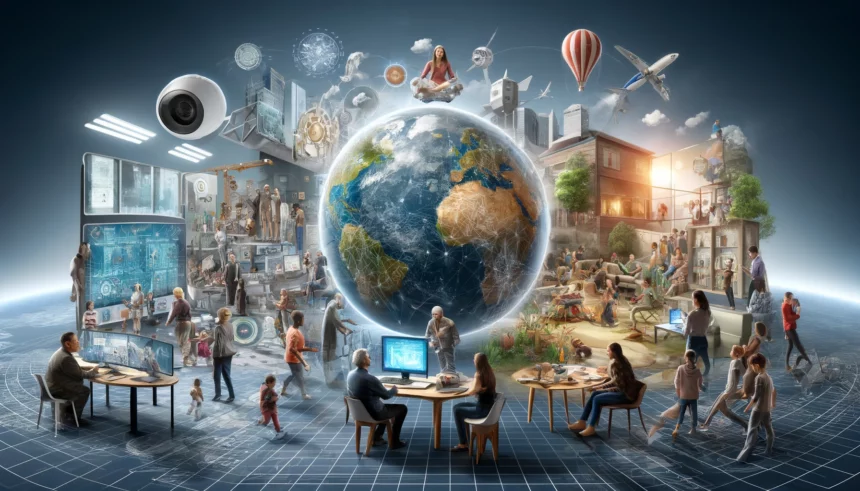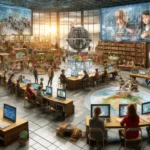As we navigate through life, the impact of technology on our cultural fabric is undeniable. In this piece, we explore the top ten ways technology has reshaped our society, affecting everything from how we communicate and work, to how we enjoy entertainment and look after our health. Let’s dive into these transformations and discuss how they’re making our world a more interconnected, dynamic place.
1. Communication Evolution
- Key Changes:
- Rise of emojis, GIFs, and internet slang in daily conversations.
- Social media redefining interpersonal interactions.
- Online platforms becoming crucial for networking and maintaining relationships.
Social media and instant messaging have revolutionized the way we connect, turning emojis and acronyms into fundamental elements of our digital language. This evolution affects not only how we express our feelings but also the speed at which we build and maintain relationships globally.
2. Altered Social Dynamics
- Key Observations:
- Digital realms increasingly important for social and professional interactions.
- The internet becoming a primary platform for forming relationships.
The digital landscape has become a new frontier for socializing, drastically altering the traditional dynamics of how we interact and connect with others.
3. Transformed Work Culture
- Major Shifts:
- Remote work blurring the lines between home and office.
- Digital tools reshaping project management and teamwork.
- Moving away from the rigid 9-to-5 work schedule.
The advent of remote work and collaborative online tools has redefined traditional work environments, influencing both organizational structures and employee expectations.
4. Revolutionized Entertainment
- Innovations:
- Streaming services offering on-demand content.
- Virtual reality and immersive experiences blurring lines between real and virtual.
- Online gaming introducing new forms of interaction and competition.
Entertainment has undergone a massive transformation, with digital content now easily accessible, creating a seamless blend of traditional and modern media forms.
5. Educational Revolution
- Advancements:
- More accessible and diverse educational resources online.
- Self-paced and interactive learning options.
- Opportunities for global collaboration and knowledge sharing.
Digital platforms have democratized access to education, challenging conventional teaching methods and fostering a more inclusive learning environment.
6. Globalization and Cultural Exchange
- Impacts:
- Easier global communication and collaboration.
- Potential dilution of distinct cultural traditions.
- Exposure to diverse worldviews and information.
Technology has accelerated cultural exchange, enabling ideas and customs to cross borders faster than ever, though sometimes at the expense of local traditions.
7. Health Tech Revolution
- Developments:
- Remote health consultations and diagnoses.
- Digital monitoring of health and fitness.
- Challenges in securing personal health data.
Technological integration into healthcare has improved service delivery and personal health management, although it has also raised concerns about data privacy.
8. Environmental Awareness and Sustainability
- Contributions:
- Tech-driven sustainable products and practices.
- Platforms enabling global environmental activism.
- Smart technology enhancing energy efficiency and reducing waste.
Innovations in technology have spurred environmental awareness, driving the adoption of greener practices and products.
9. Ethical Challenges
- Concerns:
- Protecting personal data.
- Ethical dilemmas around AI and automation.
- Job displacement concerns due to automation.
The rapid pace of technological advancement has introduced complex ethical issues, particularly regarding privacy, AI, and the future of work.
10. Cultural Adaptation and Innovation
- Transformations:
- New avenues for cultural creativity and expression.
- Digital platforms hosting cultural events.
- Technology aiding in the preservation of traditional customs.
Technology has not only enabled innovation in cultural practices but has also provided new means to celebrate and preserve our heritage in the digital age.
Conclusion: The cultural implications of technological advancements are profound and far-reaching. They’re making our world more connected, adaptable, and informed. However, they also challenge our traditional views on privacy, identity, and community. I’d love to hear your thoughts on these shifts. Feel free to comment below or share this article on social media. Let’s discuss how we can leverage these technologies to enrich our cultural landscape.
















